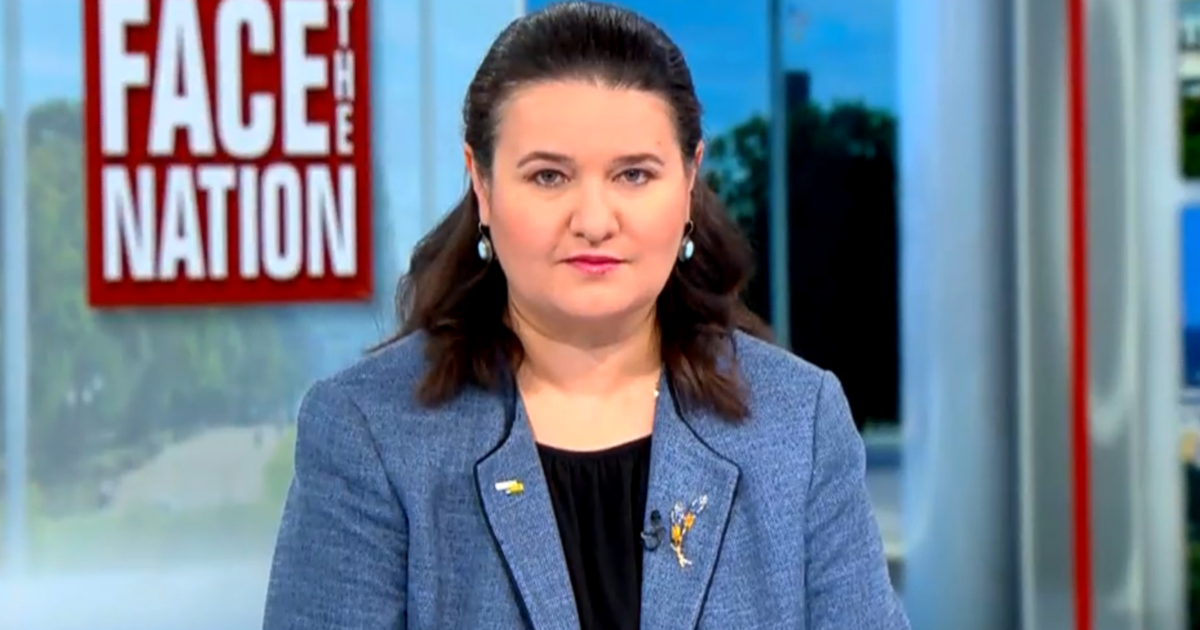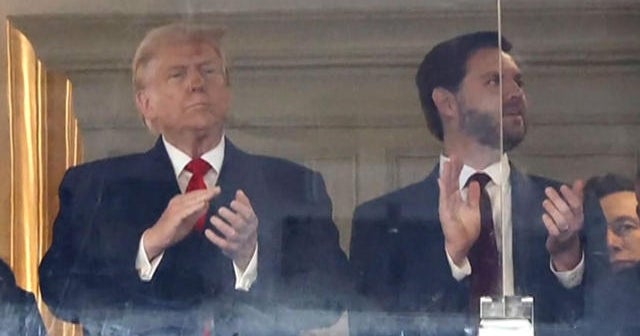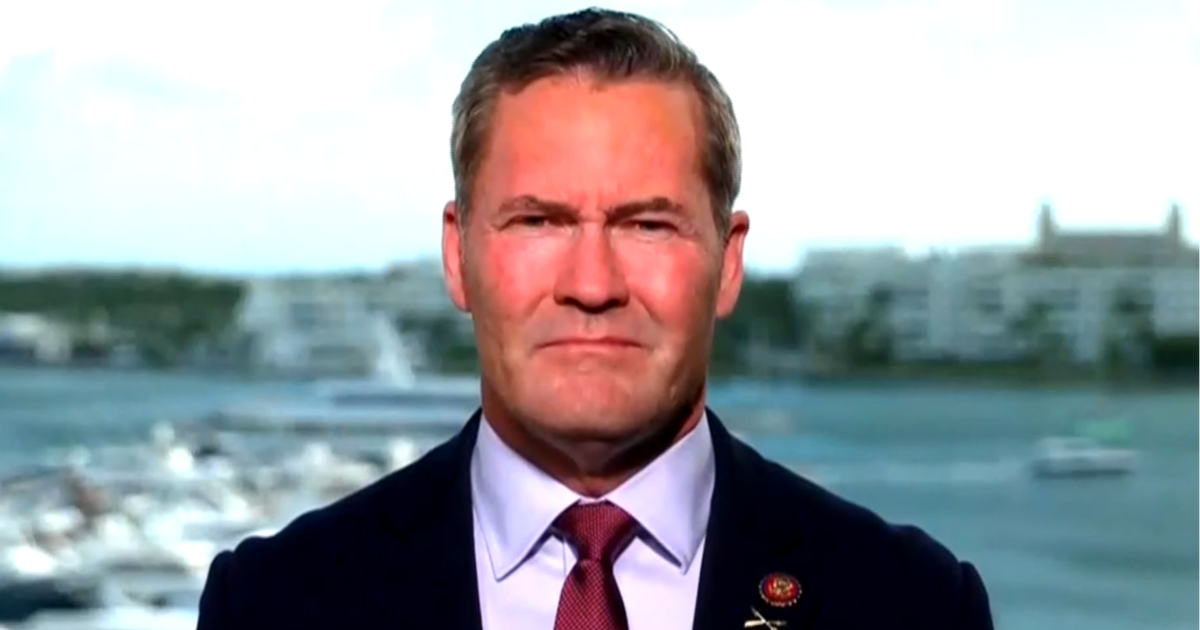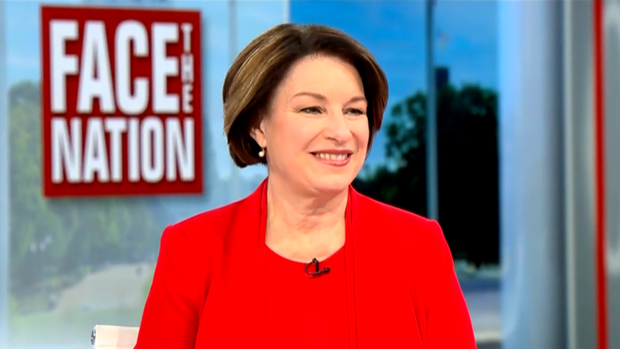CBS News
Transcript: Oksana Markarova on “Face the Nation with Margaret Brennan,” Dec. 15, 2024

The following is a transcript of an interview with Oksana Markarova, Ukrainian ambassador to the U.S., on “Face the Nation with Margaret Brennan” that aired on Dec. 15, 2024.
MARGARET BRENNAN: And we’re joined now by the Ukrainian ambassador to the United States, Oksana Markarova. Good to have you back with us.
UKRAINIAN AMBASSADOR TO THE U.S. OKSANA MARKAROVA: Thank you for having me and blessed Sunday to all.
MARGARET BRENNAN: No Western Power, as you know, is sending troops to Ukraine to help Ukrainian forces, but Russia’s got North Korean troops now who are fighting on their side. Yesterday, President Zelensky said Russia has been using a significant number of North Koreans. How are they fighting?
AMB. MARKAROVA: Yes, so and we are not asking for other troops. Ukrainians are still capable of defending our own country. We’re asking for the military support. Yesterday, we have seen those tens of thousands of troops that we were warning the word about. We have seen hundreds of them on the battlefield already, and we are successfully fighting with them as we are fighting with the Russians. I mean, look we we see them now in Kursk Oblast only, and our brave defenders were not only able to kill a lot of them, but also keep the positions. So it’s difficult, of course, to see the reinforcement from this axis of evil, but it will not change anything for us. We will continue defending the very long line, whether it’s in southern eastern Ukraine or whether it’s our defensive operation in Kursk.
MARGARET BRENNAN: And in the meantime, the North Korean troops are getting trained in Modern Warfare, and they’re learning in Ukraine- I mean, right there.
AMB. MARKAROVA: Absolutely. And we also have to worry about what is it that Russia is promising or even delivering to North Korea in exchange for this and Korean missiles.
MARGARET BRENNAN: But I also raised the manpower issue because it’s a problem for Ukraine as well. Military Recruitment is tough right now in Ukraine. There has been pressure on your government by the United States to lower the draft age so that you can boost the number of fighters. This is arguably a bigger issue than the weaponry itself. Is it affecting the ability of Ukraine to keep up this fight?
AMB. MARKAROVA: I wouldn’t agree that it’s a bigger issue than the equipment itself. We still have, first of all, we have a number of young people fighting for Ukraine, and they are volunteering, and women are volunteering. Ukraine is one of the countries that lifted all restrictions for women, for example, and we have 60,000 of women in the armed forces. With the recruitment, the last changes to the law on mobilization already allowed us to create new brigades, which we are training now. And the problem is to have enough equipment to train them on, so that we can actually not send to the battlefield like Russians do, right, unprepared, whether it’s North Korean to unprepared Russians, but to send soldiers who can do and deliver on a mission. And it’s very important for us, because every person matters for Ukrainians. Of course there are challenges, and we have the plan and we know how to do it, because again, this is our home we are defending. So when it’s necessary, all of us are going to be defending our country, but weapons and having more weapons, especially long range, especially something to counter this 3000 Glide bombs every month that Russians are sending against us.
There’s missiles for both Russian and North Korean missiles. I mean, it’s still a question of artillery and weapons and air defense, most importantly, and the more we can have, the faster we can- the more efficiently we can defend.
MARGARET BRENNAN: Well, the Biden administration has been releasing more weapons just in the last week alone. But Donald Trump gave an interview to Time Magazine, and he said the United States is escalating by allowing for weapons- missiles to be shot into Russian territory. He specifically focused in on that. He does not like that Ukraine is doing it. What does that mean for you on day one of the Trump administration?
AMB. MARKAROVA: Well, let me say, start by saying thank you to all American people, really, for standing with us all this time. Let me thank President Biden and his administration for all the support. Let me thank President Trump. He is the one who made a historic decision to provide us with Javelins, actually, to provide us with lethal aid in the first place–
MARGARET BRENNAN: –back in 2017.
AMB. MARKAROVA: Yes. So right now, we have to do everything in order to stop Russia. And we know it’s- it could be stopped. It was recently stopped in Syria. We liberated more than 50% that they have taken. We actually kicked them out from the Black Sea, just with our own naval drone capabilities. They could, they- we can stop them the more equipment we have, especially including the longer range equipment in order to be able to degrade the attack capabilities faster, the faster they will either come to the table, because, again, Ukraine wants peace. Nobody wants peace more than us. Ukraine was never a problem. We never initiated this conflict, and we negotiated at the first sign- remember, in 2022 when Russians started negotiations, they, of course, did not negotiate peace. They negotiated the pause. As we just heard Congressman Waltz, who absolutely rightfully said, it has to be peace, not a pause.
MARGARET BRENNAN: He was careful. He didn’t give a lot of specifics as to what the Trump policy will be but we do know that Viktor Orban was at Mar-a-Lago this past week, and he talks to Vladimir Putin, and he’s talking about a Christmas pause. Do you see a chance for a Christmas ceasefire and prisoner exchange?
AMB. MARKAROVA: This is very difficult winter, after Russia destroyed our- a lot of our energy infrastructure. And after you know, we are going through this difficult fights, both on the front line, but also civilians suffering from the deadly missile attacks–
MARGARET BRENNAN: –Just this past week.
AMB. MARKAROVA: Yes, at the same time, you know, every time Russia is talking about some ceasefire, they are lying. Russians are lying, and we see they were not able to defend their body- terrorist body Assad, and he fled to Russia. And we see horrible atrocities in Sednaya Prison, like we see in Ukraine everywhere. It reminded me isolation prison in Donetsk–
MARGARET BRENNAN: Right.
AMB. MARKAROVA: Which still is operational. So look, you know, if Russia wants seriously to stop it, they can stop it anytime.
MARGARET BRENNAN: Ambassador, I have to leave it there. Thank you so much for joining us.
AMB. MARKAROVA: Thank you.
MARGARET BRENNAN: We’ll be back in a moment.
CBS News
Sen. Amy Klobuchar says presidential pardon process “cries out for reform”

Washington — Sen. Amy Klobuchar, a Minnesota Democrat, said Sunday that the entire presidential pardoning process “cries out for reform” following some controversial commutations and pardons made by President Biden, including when the president issued a blanket pardon of his own son, Hunter.
“This whole process cries out for reform because otherwise you undermine the justice system,” Klobuchar said on “Face the Nation with Margaret Brennan.”
The White House announced early Thursday that President Biden was commuting the sentence of nearly 1,500 people, marking the widest reaching clemency granted by a president in a single day. Among the individuals, many of whom had been placed on home confinement during the COVID-19 pandemic, were some who have sparked controversy in recent days — including a judge involved in a so-called “Kids for Cash” scheme.
Klobuchar interjected that she “did not like that one,” adding that she did not agree with all the pardons and commutations.
“I have no doubt there were some righteous pardons in this group,” Klobuchar said. “But there were a number that I think make no sense at all.”
CBS News
Further, she said she didn’t agree with Mr. Biden’s pardon of his son, Hunter, earlier this month.
Klobuchar noted that she has also disagreed with a number of pardons that President-elect Donald Trump made during his first term. And the Minnesota Democrat said that while the pardon ability is part of the Constitution and has a long history that she said wouldn’t be changed, she would advocate for reforms.
“We should have some kind of an outside board that governors have,” she said. “Governors have the ability to give mercy to people after years have gone by, but a lot of them have boards that make recommendations and other things, instead of people just doing it in the middle of the night.”
Klobuchar suggested that over a year-long period, a board could look at individual petitions rather than large groups, which she argued undermines the work of FBI agents and prosecutors who took on the cases.
“Might you want mercy 10 years later?” Klobuchar said. “Yes, you might. But let’s at least look at these on a factual basis and a risk basis, instead of just in the middle of the night a month before a president leaves.”
CBS News
12/15: Face the Nation – CBS News

Watch CBS News
Be the first to know
Get browser notifications for breaking news, live events, and exclusive reporting.
CBS News
Rep. Mike Waltz says Orbán “clearly has a good relationship with Trump” that could be key to Russia-Ukraine diplomacy

Rep. Mike Waltz, the Florida Republican who is Donald Trump’s pick for his national security adviser, said Sunday that the president-elect has a good relationship with Hungarian Prime Minister Viktor Orbán that he suggested could play a key role in bringing an end to the war in Ukraine.
“Orbán has regular engagement with the Russians, and he clearly has a good relationship with President Trump,” Waltz said on “Face the Nation with Margaret Brennan.” “I would hope the entire world would want to see some type of cessation to the slaughter that is happening in eastern Ukraine.”
Orbán, an authoritarian leader with ties to Russia, met with Trump at Mar-a-Lago last week, along with Waltz and Elon Musk. Days after the meeting, Orbán announced that he had spoken to Russian President Vladimir Putin, saying that “we are taking every possible diplomatic step to argue in favour of a ceasefire” and peace talks. He later appeared to float a Christmas ceasefire and a prisoner swap between Russia and Ukraine.
Waltz wouldn’t say whether Orbán’s message to Putin came out of the meeting with Trump. But he noted that “we’re going to continue to talk,” and that “President Trump’s made it clear he wants this war to stop.”
CBS News
“We need to stop the fighting,” Waltz said. “If that is some type of ceasefire as a first step, again, we’ll take a hard look at what that means.”
Trump has repeatedly pledged that he would end the war between Russia and Ukraine immediately upon returning to the White House while claiming that Putin would never have invaded the country if he were president. Waltz said that since Trump’s victory in the election, the framework of discussion with world leaders surrounding the war between Russia and Ukraine has shifted to talk of how the conflict comes to an end.
“How do we end this conflict? How do we do it in a way that restores stability, stops the carnage, and hopefully makes this a permanent end, not just a pause?” Waltz said. “Those are all things that we’re thinking through.”
The meeting with Orbán came after Trump met with Ukrainian President Volodymyr Zelenskyy on Dec. 7 in Paris after which Trump called for an immediate ceasefire and for negotiations between Russia and Ukraine to begin.
Zelenskyy said following the president’s statement that the war “cannot simply end with a piece of paper and a few signatures.” And though he said he had a “good meeting” with Trump, he warned that a ceasefire “without guarantees can be reignited at any moment.”
The Biden administration announced last week it would be sending another package of weapons to Ukraine, valued at $500 million, according to Reuters. Ukrainian ambassador to the U.S. Oksana Markarova, also appearing on “Face the Nation” on Sunday, said that her country’s ability to fight off Russian forces is “still a question of artillery and weapons and air defense, most importantly, and the more we can have, the faster we can- the more efficiently we can defend.”
But Markarova noted “we are not asking for other troops. Ukrainians are still capable of defending our own country. We’re asking for the military support.”



